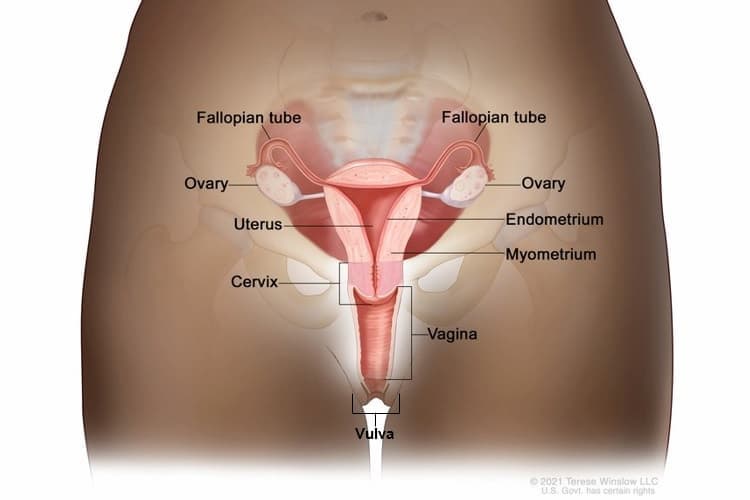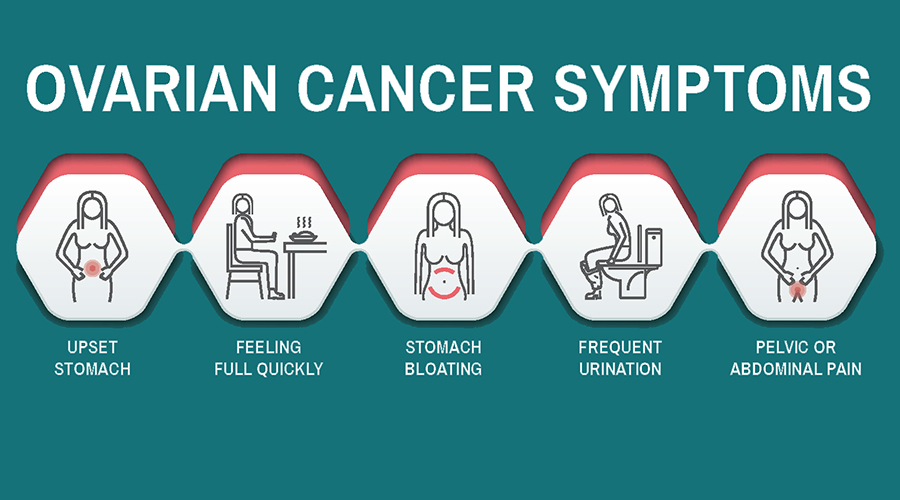Table of Contents
Basic Information About Ovarian Cancer
Cancer is a disease in which abnormal cells in the body grow out of control. Cancer is always named for the part of the body where it starts, even if it spreads to other body parts later.

This diagram shows different parts of a woman’s reproductive system.
Ovarian cancer is a group of diseases that originates in the ovaries, or in the related areas of the fallopian tubes and the peritoneum. Women have two ovaries that are located in the pelvis, one on each side of the uterus. The ovaries make female hormones and produce eggs. Women have two fallopian tubes that are a pair of long, slender tubes on each side of the uterus. Eggs pass from the ovaries through the fallopian tubes to the uterus. The peritoneum is the tissue lining that covers organs in the abdomen.
When ovarian cancer is found in its early stages, treatment works best. Ovarian cancer often causes signs and symptoms, so it is important to pay attention to your body and know what is normal for you. Symptoms may be caused by something other than cancer, but the only way to know is to see your doctor, nurse, or other health care professional.
Some mutations (changes in genes) can raise your risk for ovarian cancer. Mutations in the breast cancer susceptibility genes 1 and 2 (BRCA1 and BRCA2), and those associated with Lynch syndrome, raise ovarian cancer risk.
Ovarian cancers come in a variety of different tumor types. The most common tumor type is high-grade serous carcinoma, occurring in about 70% of ovarian cancer cases.
What Are the Risk Factors for Ovarian Cancer?
There is no way to know for sure if you will get ovarian cancer. Most women get it without being at high risk. However, several factors may increase a woman’s risk for ovarian cancer, including if you—
- Are middle-aged or older.
- Have close family members (such as your mother, sister, aunt, or grandmother) on either your mother’s or your father’s side, who have had ovarian cancer.
- Have a genetic mutation (abnormality) called BRCA1 or BRCA2, or one associated with Lynch syndrome.
- Have had breast, uterine, or colorectal (colon) cancer.
- Have an Eastern European or Ashkenazi Jewish background.
- Have endometriosis (a condition where tissue from the lining of the uterus grows elsewhere in the body).
- Have never given birth or have had trouble getting pregnant.
In addition, some studies suggest that women who take estrogen by itself (without progesterone) for 10 or more years may have an increased risk of ovarian cancer.
If one or more of these factors is true for you, it does not mean you will get ovarian cancer. But you should speak with your doctor about your risk. If you or your family have a history of ovarian cancer, speak to your doctor about genetic counseling.
What Can I Do to Reduce My Risk of Ovarian Cancer?
There is no known way to prevent ovarian cancer, but these things are associated with a lower chance of getting ovarian cancer—
- Having used birth control pills for five or more years.
- Having had a tubal ligation (getting your tubes tied), both ovaries removed, or a hysterectomy (an operation in which the uterus, and sometimes the cervix, is removed).
- Having given birth.
- Breastfeeding. Some studies suggest that women who breastfeed for a year or more may have a modestly reduced risk of ovarian cancer.
While these things may help reduce the chance of getting ovarian cancer, they are not recommended for everybody, and risks and benefits are associated with each. Avoiding risk factors may lower your risk, but it does not mean that you will not get cancer. Talk to your doctor about ways to reduce your risk.
What Are the Symptoms of Ovarian Cancer?

Ovarian cancer may cause the following signs and symptoms—
- Vaginal bleeding (particularly if you are past menopause), or discharge from your vagina that is not normal for you.
- Pain or pressure in the pelvic area.
- Abdominal or back pain.
- Bloating.
- Feeling full too quickly, or difficulty eating.
- A change in your bathroom habits, such as more frequent or urgent need to urinate and/or constipation.
Pay attention to your body, and know what is normal for you. If you have unusual vaginal bleeding, see a doctor right away. If you have any of the other signs for two weeks or longer and they are not normal for you, see a doctor. They may be caused by something other than cancer, but the only way to know is to see a doctor.
What Should I Know About Screening?
There is no simple and reliable way to screen for ovarian cancer in women who do not have any signs or symptoms.
Screening is when a test is used to look for a disease before there are any symptoms. Cancer screening tests work when they can find disease early, when treatment works best. Diagnostic tests are used when a person has symptoms. The purpose of diagnostic tests is to find out, or diagnose, what is causing the symptoms. Diagnostic tests also may be used to check a person who is considered at high risk for cancer.
The Pap test does not check for ovarian cancer. The only cancer the Pap test screens for is cervical cancer. Since there is no simple and reliable way to screen for any gynecologic cancer except for cervical cancer, it is especially important to recognize warning signs, and learn what you can do to reduce your risk.
Here is what you can do—
- Pay attention to your body, and know what is normal for you.
- If you notice any changes in your body that are not normal for you and could be a sign of ovarian cancer, talk to your doctor about them.
Ask your doctor if you should have a diagnostic test, like a rectovaginal pelvic exam, a transvaginal ultrasound, or a CA-125 blood test if you have any unexplained signs or symptoms of ovarian cancer. These tests sometimes help find or rule out ovarian cancer.
How Is Ovarian Cancer Treated?
If your doctor says that you have ovarian, fallopian tube, or primary peritoneal cancers, ask to be referred to a gynecologic oncologist—a doctor who was trained to treat cancers of a woman’s reproductive system. Gynecologic oncologists can perform surgery on and give chemotherapy (medicine) to women with ovarian cancer. Your doctor can work with you to create a treatment plan.
Types of Treatment
Treatment for ovarian cancer usually involves a combination of surgery and chemotherapy.
- Natural cancer treatment for Ovarian Cancer: read more
- Surgery: Doctors remove cancer tissue in an operation.
- Chemotherapy: Using special medicines to shrink or kill the cancer. The drugs can be pills you take or medicines given in your veins, or sometimes both.
